13. "THE GREAT WAR" (WORLD WAR ONE)

1917
CONTENTS
 The German pullback to the Hindenburg The German pullback to the Hindenburg
Line
 Russia's "February Revolution" Russia's "February Revolution"
 The Failed Nivelle Offensive The Failed Nivelle Offensive
 The English squander more men to The English squander more men to
reach the Paschendael Heights
 The Italians retreat from Caporetto The Italians retreat from Caporetto
 The German homeland struggles under The German homeland struggles under
the British blockade
 The Americans enter the War The Americans enter the War
 Kerensky's Provisional Government Kerensky's Provisional Government
continues the Russian war effort
 Russia's "October Revolution" Russia's "October Revolution"
 The war in the Middle East and Africa The war in the Middle East and Africa
The textual material on page below is drawn directly from my work
A Moral History of Western Society © 2024, Volume Two, pages 86-93.
THE
GERMAN PULLBACK TO THE HINDENBURG LINE |
The Germans retreat to the
well-prepared Hindenburg Line ... leaving devastation behind them – early 1917

There were supposedly three focal
points to the Nivelle offensive: Arras in the North, Chemin des Dames in
the Center and Champagne in the East (white arrows)
Marshall, p. 209
 A French bridge near Ham
blown by the retreating Germans
A French bridge near Ham
blown by the retreating Germans

An apple orchard leveled
by the retreating Germans
 Bapaume pillaged by the retreating
Germans
Bapaume pillaged by the retreating
Germans
Imperial War Museum,
London

The Hindenburg Line at
Bullecourt
Three trench lines
and communications
are here shown, with acres of wire entanglements in the left foreground
protecting first-line positions. Beyond Bullecourt runs the St. Quentin
Canal and tunnel, which was taken late in September by the Twenty-seventh
and Thirtieth American divisions."
"The Literary Digest History
of the World War", volume V, p. 384 (1920)
|
RUSSIA'S "FEBRUARY REVOLUTION"
[taking
place in early March on the Western calendar] |
Although
Russia’s army greatly outnumbered its enemies, it lacked the supplies
necessary to make it an effective fighting force. Weapons and
ammunition were always in short supply, demoralizing the Russian
soldier who was expected to fight on empty-handed. Russian
civilians were well aware of these problems and were quick to blame the
Tsar and his government for these scandalous shortcomings.
Very unwisely, in September of 1915, the Tsar decided that he
personally must lead the military from the front and left the governing
of Russia to his wife. And the Tsarina in turn left matters to
Rasputin, who made and unmade governments with his own personal
appointments, further scandalizing the Russians in their dwindling
respect for their imperial government.
By the beginning of 1917, wartime shortages had hit the civilian
population as cruelly as it had the military. Food in the cities
was very difficult to obtain, and grumbling turned into a full-scale
protest in March by Petrograd1 workers, joined by masses of women.
The protest built force over the next days, and soldiers sent to
restore order began to join the protesters (reminiscent of the startup
of the French Revolution!). At this point the Russian imperial
social-political order simply began to break down.
The Russian legislature (the Duma) tried to bring order to the chaos by
setting up a Provisional Government, on the same day that a Soviet
(Council) of Workers was established in Petrograd.
The Tsar abdicates
Word then reached the Tsar at the front that even his own bodyguard had
joined the revolt, and under advisement of his generals, Nicholas
simply abdicated his throne (March 15). He had not been enjoying
any of his governmental responsibilities for a long time … and he was
quite content to leave these agonizing matters for others to deal with.
At first Prince Lvov took command of the new Provisional Government …
who immediately undertook a number of social reforms that he hoped
would cool down Russian tempers. These reforms included the
calling of a national election, with the goal of a new Duma undertaking
the task of composing a new Russian Constitution. So it gave the
appearance at this point that Russia was no longer an autocracy, but
was finally in the process of joining the ranks of the world's
"democracies."
1Russia's
imperial city had been changed in name from St. Petersburg to Petrograd
because, under the rising nationalist impulse at the beginning of the
war, "Petrograd" sounded so much more "Russian" than "St.
Petersburg." Then with the coming to power of the Communists (and
Lenin’s subsequent death), the city would be renamed as
"Leningrad." Finally it would have its original name, "St.
Petersburg," restored with the fall of the Communist system at the
beginning of the 1990s.

Czar Nicholas II blessing
the Russian troops
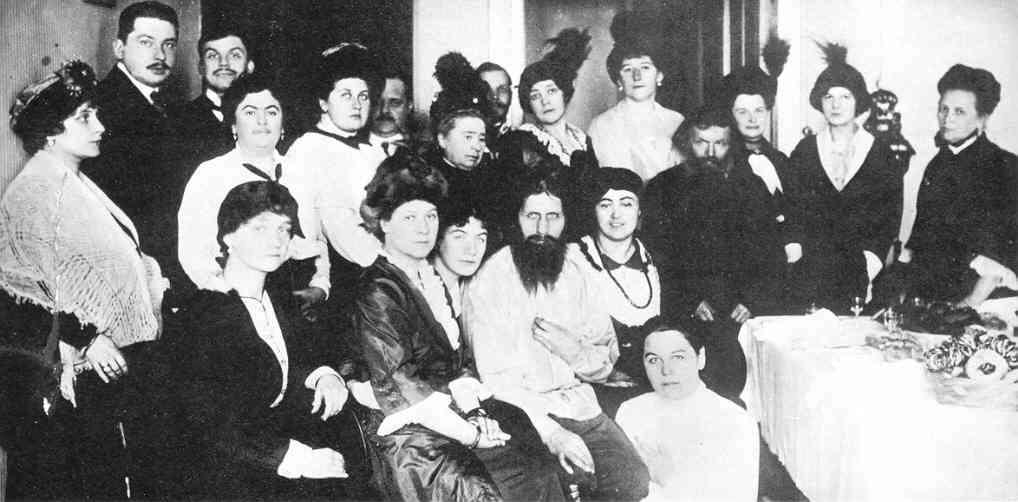
Father Grigori Efimovich
Rasputin and adoring women of the Russian nobility - 1916 (just prior to his
murder)
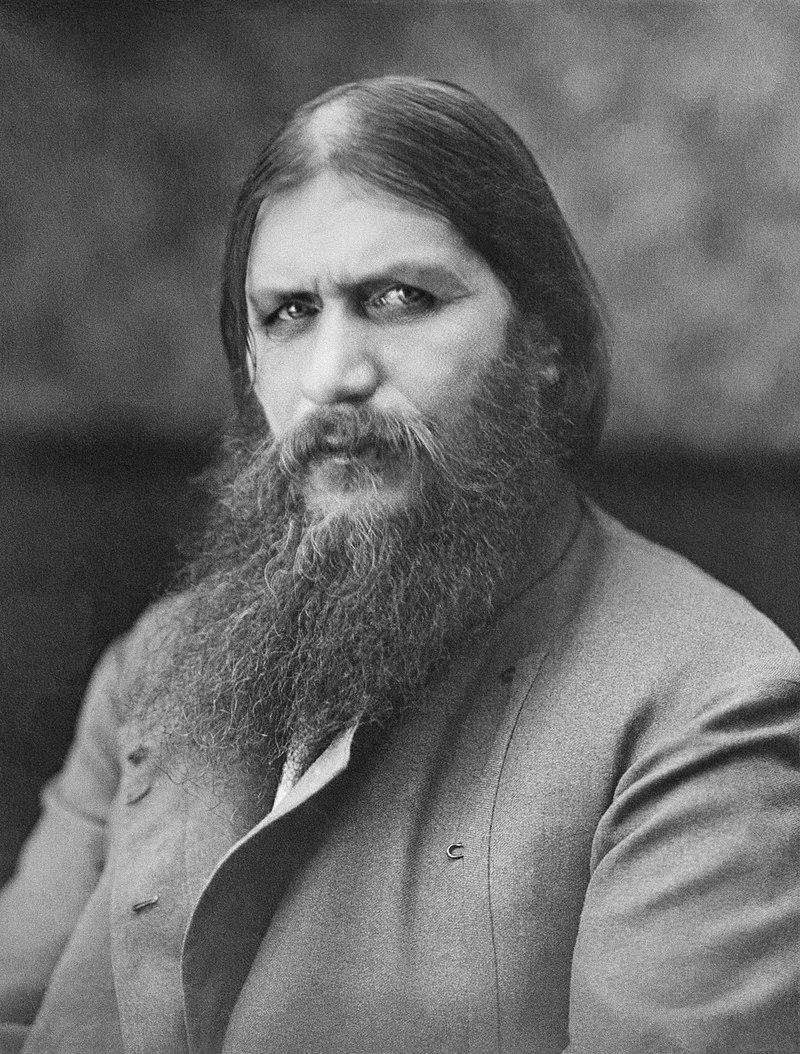
Rasputin - assassinated on
December 31st, 1916

The last glory days of the
Russian Imperial household
From left to right, Grand
Duchess Anastasia, Grand Duchess Olga, Tsar Nicholas II, Tsarevich Alexei, Grand Duchess Tatiana,
and Grand Duchess Maria, and Kuban Cossacks, ca. 1916.
Romanov Collection, General
Collection, Beinecke Rare Book and Manuscript Library, Yale University
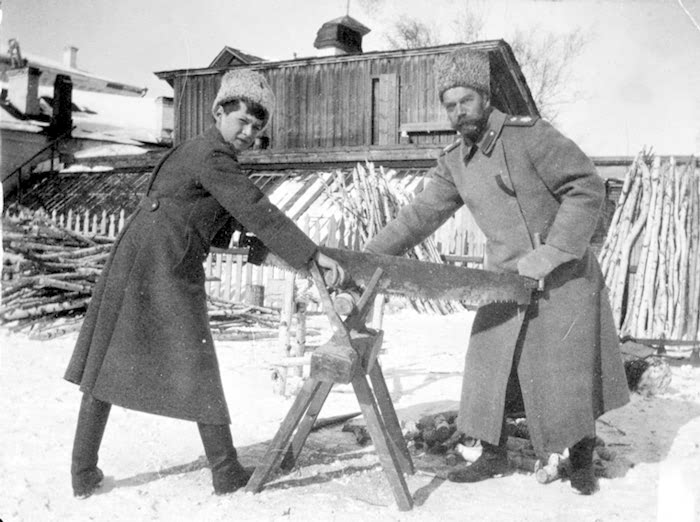 Tsarevich Alexei Nikolaevich
and Tsar Nicholas II sawing wood at Tobolsk in 1917
Tsarevich Alexei Nikolaevich
and Tsar Nicholas II sawing wood at Tobolsk in 1917
Romanov Collection, General
Collection, Beinecke Rare Book and Manuscript Library, Yale University
The "February" Revolution
(Mid-March on the Western or Julian calendar)

Female textile workers calling
for bread - International Workers' Day march in Petrograd - March 1917
 Troops called in to keep
order in Petrograd as strikes and riots erupt over shortages of bread and
coal
Troops called in to keep
order in Petrograd as strikes and riots erupt over shortages of bread and
coal

Soldiers riding through the
streets of a riotous Petrograd (March 11-12) precipitating the Tsar's
abdication

Student militiamen in Moscow
during the fighting which led to the Tsar's abdication.

Troops from the Petrograd
garrison who take over the Tsar's Winter Palace after his abdication
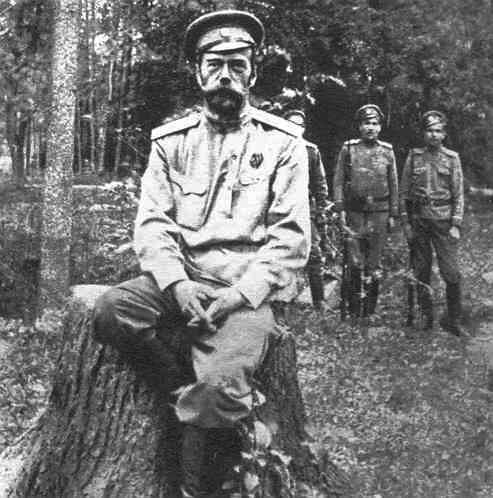 Tsar Nicholas II in detention
after his abdication in March 1917
Tsar Nicholas II in detention
after his abdication in March 1917
THE
FAILED "NIVELLE OFFENSIVE" – AND A DETERIORATING FRENCH MORALE IN THE TRENCHES |
The ill-fated "Nivelle Offensive"
April 16 - May 21
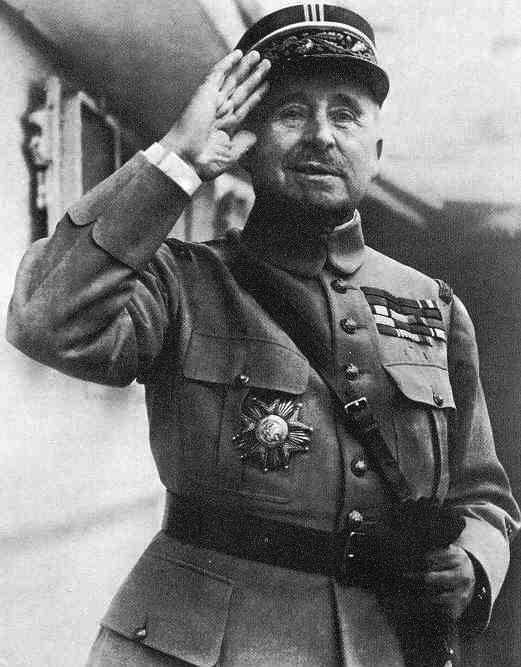
General Robert Nivelle
He mistook the German pullback for
weakness in the German lines – and ordered a circling attack around the line of German retreat.
The results for the French were disastrous.
Radio Times Hulton Picture
Library

Canadian machine gunners
at Vimy Ridge - April 1917
The
Canadians took the important
position of Vimy Ridge on Easter Monday, April 9, 1917.
"They advanced with brilliance, having taken the whole
system of German front-line trenches between dawn and 6.30 A.M. This shows squads of machine gunners operating from shell-craters in support of the infantry on the plateau above the
ridge.

Mark II Tank Number advancing
with Canadian Infantry at Vimy - April 1917
Library and Archives
Canada (PA-004388)
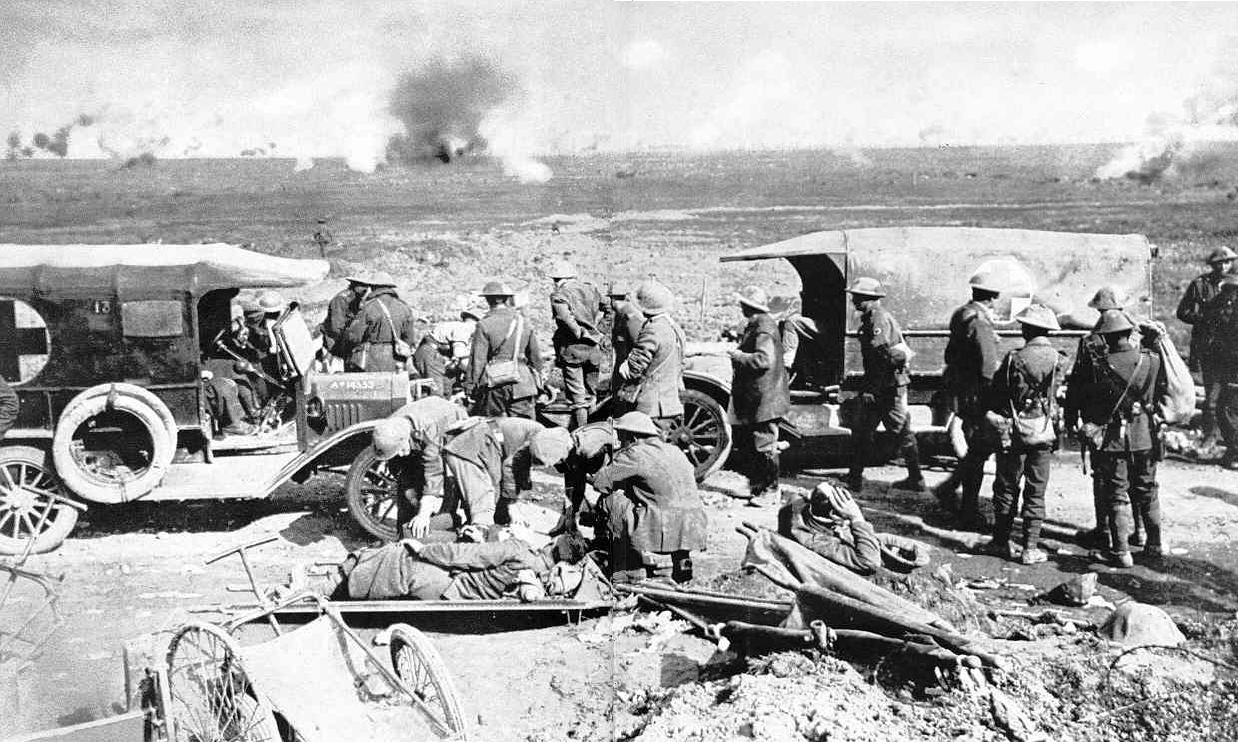
Medical corpsmen treating
British wounded during the Nivelle Offensive - 1917
 British Mark II tank captured
by German troops at Bullecourt near Arras - 11 April 1917
British Mark II tank captured
by German troops at Bullecourt near Arras - 11 April 1917

A failed French attack upon
a German position in Champagne - 1917
War weariness sparks revolt
among French soldiers - May and June 1917 (probably encouraged by the news of
widespread soldiers' revolts among the Russians)
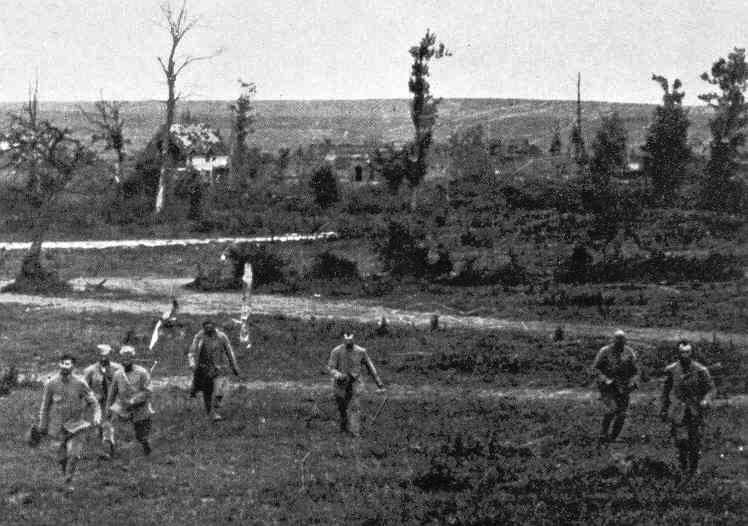 French soldiers begin to
desert
French soldiers begin to
desert
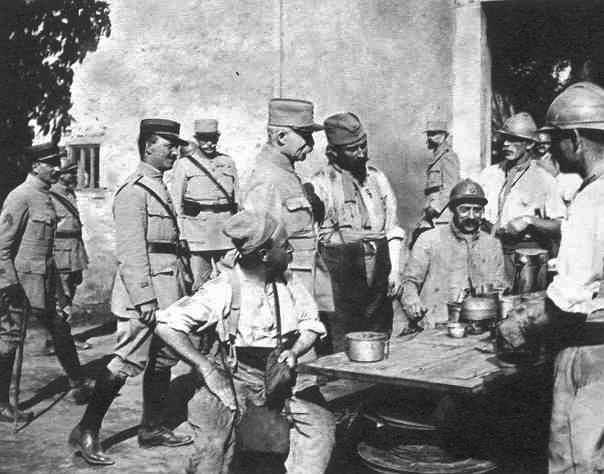 Pétain meets with
troops to boost French morale
Pétain meets with
troops to boost French morale
 Georges Clemenceau by Cecilia
Beaux (1920)
Georges Clemenceau by Cecilia
Beaux (1920)
Prime Minister of France
- 1906-1909 and 1917-1920
Smithsonian American Art
Museum
THE
ENGLISH SQUANDER MORE MEN TO REACH THE PASCHENDAEL HEIGHTS |
The British conduct an major
assault on German lines at Messines (south of Ypres)
 Destroyed German trench at
the Battle of Messines
Destroyed German trench at
the Battle of Messines
The British effort to take
Passchendaele Ridge in the "Third Ypres" assault

British batteries pounding
the German lines - 1917
 Stretcher bearers mired in
mud in the Third Ypres - August 1, 1917
Stretcher bearers mired in
mud in the Third Ypres - August 1, 1917
Imperial War Museum,
London

Australian infantry small
box respirators Ypres 1917
The soldiers are from the
45th Battalion, Australian 4th Division at Garter Point near Zonnebeke,
Ypres sector, 27 September 1917.
Australian War Memorial
catalogue number E00825

A French position near Steenstraete
on the Yser under bombarment
 Chateau Wood - Ypres -
1917
Chateau Wood - Ypres -
1917
Soldiers of an Australian 4th Division
field artillery brigade on a duckboard track passing through Chateau Wood, near Hooge in the Ypres salient,
29 October 1917.
Australian War Memorial
collection number E01220

"View of Ypres: Photograph
taken from a flying machine"
| "The pitiful ghost of one
of ravaged
Belgium's most beautiful and historic cities. In the central foreground
may be seen the roofless remains of the famous Cloth Hall, the largest
edifice of its kind in the kingdom, begun by Count Baldwin IX of Flanders
in the year 1200. Just beyond looms the scarred and desecrated Cathedral
of St. Martin. On all sides are ruin and desolation, where three summers
ago dwelt nearly 20,000 happy, thrifty people, engaged chiefly in the peaceful
pursuit of making Valenciennes lace." |
From the National Geographic
(1917) Vol 31, p. 337.
THE
ITALIANS RETREAT FROM CAPORETTO |
The 60-mile retreat of the
Italians from Caporetto - end of October to mid November


Marshall, p.
216.

The crowded road from
Caporetto
Imperial War Museum,
London
THE
GERMAN HOMELAND STRUGGLES UNDER THE BRITISH BLOCKADE |
With the British
effectively blockading the delivery of food delivered from America
and elsewhere, the situation in the Geman
homeland is equally grim ...
except that the Germans seem to be holding strong
nonetheless 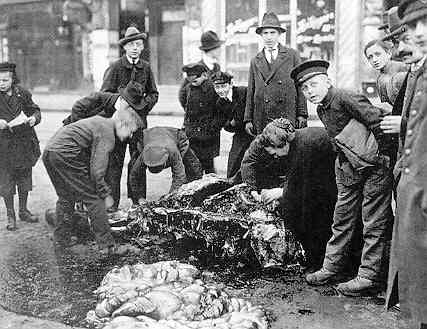 Starving Berliners cutting
up a dead horse for food - 1917
Starving Berliners cutting
up a dead horse for food - 1917
Imperial War Museum
THE
AMERICANS ENTER THE WAR |
Wilson’s War “To Make the
World Safe for Democracy”
|
The British blockade of Germany
In
violation of all traditional international law, Britain had taken up
the strategy of blockading the shipment to Germany not only of any war
materials from its previous suppliers (including importantly the United
States), but out of sheer desperation in the March of 1915 announced
that it was blockading the shipment of all overseas goods, even
foodstuffs, to Germany. As Germany was highly dependent on
imports of all varieties, the British intended to force Germany into
submission by simply cutting off the foreign lifeline on which it
depended.
America as a neutral nation protested vehemently. But Britain would not back down.
The German U-boat
The German navy was no match for the British navy and there was little
likelihood that Germany would be able to break the blockade ... except
through the development of their new sea weapon, the Unterseeboot
(submarine) or U-boat. When in the early years of the war the
U-boat took out a number of British cruisers, the Germans rushed to
develop this new weapon. Just as the British announced a naval
blockade on all commodities going to Germany, Germany announced that
any ships entering British or Irish waters would be considered hostile
and subject to sinking.
American "neutrality"
Now caught in the middle of this was the
neutral America ... with considerable interest in sea trade. What
to do?
Despite America’s own English ethnicity, America was actually a
multi-ethnic society with multitudes of Irish and German Americans, who
had reasons of their own for wanting to support Germany rather than
England. Thus the best policy for America was to stay out of the
war. But that would not be easy.
The sinking of the Lusitania
America
(and much of the world) then found cause to rise in anger against
Germany when in May of 1915 a German U-boat sank the passenger liner Lusitania,
drowning nearly 1200 civilians … including over a hundred Americans –
among them some of America's most prominent citizens. But the
Germans had their own protests to issue in the matter … having warned
beforehand that just as Britain had put in place a naval blockade
against goods destined for Germany, so Germany was doing the same …
using its U-boat to enforce its countering blockade. But somehow
American opinions did not see these as equal matters … even when it was
revealed that the Lusitania was carrying to Britain a massive amount of
contraband war goods in its hold.
Noting the American reaction, and not wishing to turn America into a
wartime enemy, Germany promised to end its blockade. Britain
however did not end its blockade. So America's one-sided
"neutrality" continued as before.
"He keeps us out of war"
American President Wilson tried hard to maintain American neutrality
not only abroad but also at home where opinions continued to be sharply
divided. British propaganda about the bloody German Huns and
their violation of helpless Belgium seemed to reach more ears than the
German effort to counter this image with pro-German propaganda.
Little by little American opinion was turning ever more hostile towards
Germany (though hardly pro-English at the same time, for British
violation of American rights as a neutral also angered Americans
deeply). But Wilson still wanted to keep America from getting
involved. Thus as late as November 1916 Wilson presented himself
for reelection to the White House on the basis of having successfully
kept America out of the war. But things were about to change.
The resumption of the U-boat attacks
American
President Wilson tried hard to maintain American neutrality not only
abroad but also at home where opinions continued to be sharply
divided. British propaganda about the bloody German Huns and
their violation of helpless Belgium seemed to reach more ears than the
German effort to counter this image with pro-German propaganda.
Little by little American opinion was turning ever more hostile towards
Germany (though hardly pro-English at the same time, for British
violation of American rights as a neutral also angered Americans
deeply). But Wilson still wanted to keep America from getting
involved. Thus as late as November 1916 Wilson presented himself
for reelection to the White House on the basis of having successfully
kept America out of the war. But things were about to change.
The resumption of the U-boat attacks
The British blockade of Germany was slowly driving Germany to
starvation. The situation was so bad that the Germans now
subsisted mostly on potatoes and turnips, except that in the summer of
1916 the potato crop failed. Thus the Germans were forced to go
through a "turnip winter", made worse by the fact that the Germans also
had no fuel to heat their homes. The blockade had to be broken or
Germany would be broken. Thus in January of 1917 the Germans
announced the resumption of U-boat attacks on the high seas.
America was furious. So was Wilson. In early February he
went before Congress to announce the end of diplomatic relations with
Germany ... and stated that if things worsened, he would return to
Congress to consider the next step (meaning war). Soon after that
Americans received news of a secret message intercepted by the British
in which Germany was proposing an absurd alliance with Mexico, with the
promise that at the end of the war Mexico would be awarded the states
of Texas, New Mexico and Arizona. Americans were now up in arms
demanding war against Germany (though not necessarily against
Austria-Hungary and Turkey).
"To make the world safe for Democracy"
inally,
with the change of government in Russia from autocracy to (supposedly)
democracy in March, Wilson could turn American involvement into not
just a desire for revenge for German U-boat attacks and national
insults, but even something he personally loved greatly: a grand
moral crusade to advance "democratic" progressivism. With Russian
autocracy having been overthrown, Great Britain, France and now also
Russia, together constituted a "democratic" front … opposed to the
remaining "autocracies" of Germany, Austria-Hungary and Turkey.
If Americans were to now join forces with the "democracies," the war
would be indeed a battle "to make the world safe for democracy."
"The war to end all wars"
Furthermore, Wilson's (and other Idealists') understanding at that time
was that with all the world coming to full democracy, the petty greed
of autocrats (which was supposedly the cause of all wars) would
end. Thus victory in this war would end up making it "the war to
end all wars."
Thus on April 2nd, Wilson stood before Congress to ask for a
declaration of war, which Congress four days later was more than glad
to offer him.
Pure folly
In his speech before Congress, Wilson explained "democratic" matters this way:
Does not every American feel
that assurance has been added to our hope for the future peace of the
world by the wonderful and heartening things that have been happening
within the last few weeks in Russia? Russia was known by those who knew
it best to have been always in fact democratic at heart, in all the
vital habits of her thought, in all the intimate relationships of her
people that spoke their natural instinct, their habitual attitude
towards life. The autocracy that crowned the summit of her political
structure, long as it had stood and terrible as was the reality of its
power, was not in fact Russian in origin, character, or purpose; and
now it has been shaken off and the great, generous Russian people have
been added in all their naive majesty and might to the forces that are
fighting for freedom in the world, for justice, and for peace. Here is
a fit partner for a league of honour.
Here he was offering the usual Humanist creed ... that all people by
their very instincts are democratic at heart. All they need
is to be given the opportunity to put those democratic instincts into
play in a newly "freed" social environment. Like the political
Idealists of the French Revolution, Wilson had no idea whatsoever what
would actually happen to a society if the power structure it had long
lived under were to go away, were to collapse, were to be overthrown by
"revolutionaries.
But oh how noble would be the American cause ... when it joined the
mindless slaughter in the bloodied fields of Northern France. As
Wilson put matters:
There are, it may be, many
months of fiery trial and sacrifice ahead of us. It is a fearful thing
to lead this great peaceful people into war, into the most terrible and
disastrous of all wars, civilization itself seeming to be in the
balance. But the right is more precious than peace, and we shall fight
for the things which we have always carried nearest our hearts – for
democracy, for the right of those who submit to authority to have a
voice in their own governments, for the rights and liberties of small
nations, for a universal dominion of right by such a concert of free
peoples as shall bring peace and safety to all nations and make the
world itself at last free. To such a task we can dedicate our lives and
our fortunes, everything that we are and everything that we have, with
the pride of those who know that the day has come when America is
privileged to spend her blood and her might for the principles that
gave her birth and happiness and the peace which she has treasured. God
helping her, she can do no other.
America's new "democratic" mission to the world
From this point forward, Americans would now see themselves as grand
"missionaries" to the world. But it would be a mission not to
spread the Christianity that had formed the country's very strong moral
foundations on which American self-government had long been based … but
instead a mission to spread the doctrine of "democracy" – whatever that
meant. And tragically, whatever "democracy" meant was not well
understood by Americans. But a full understanding did not seem
necessary … because the word "democracy" itself had such a beautiful
ring to it – so that it was easily seen as the noblest of all
political-social-cultural causes, one worthy of even self-sacrifice in
order to advance its place in the world. And tragically, there
would be plenty of just such self-sacrifice that was going to take
place for America's young Idealists in uniform seeking to support this
noble cause.
Americans no longer understood why the country's Founding or
Constitutional Fathers set up a "republic" directed by strong
Constitutional Law … and not a "democracy" run according to the
inclinations of the people – one easily manipulated by the
self-interests of ambitious individuals. The Fathers of the 1787
American Constitution were well aware of how democracy worked for the
ancient "fathers of democracy": the Greeks. And they
certainly were not surprised when, just as their new Constitutional
Republic was coming into effect (1789), the "enlightened" French
leaders overthrew their French monarchy in order to produce a new
democratic Republic of their own in France – but instead produced only
a bloody mess … one that required the Napoleonic dictatorship to get
France back in order.
Americans were failing to understand what Aristotle had come to
understand after looking at the political dynamics of his own Greek
days (the 300s BC) – and what the American Constitutional Fathers had
also come to understand through their careful study of Aristotle and
ancient Greek and Roman history – namely, that democracy (or any other
social order) can be found to be "good" only when it is built on strong
moral foundations. And moral foundations do not come just by
decree, or by imposing it on others … or by winning some kind war
against "undemocratic" enemies (whatever that too actually
means). Except in the case of a tyrant imposing a new moral order
by brute force – and holding it in place by being able to strike fear
in the hearts of those who would dare go up against this dictator's new
social order – this is not going to happen overnight. It takes
time, usually generations, for strong and deep moral foundations to
develop for a society. And as the French Revolution made very
clear, toppling one social order, no matter how inept or cruel it might
be, does not automatically birth a new, more humane, social
order. Chaos is the guaranteed result.
Thus Wilson taking America to war to bring down European "autocracies"
was not going to lead automatically to democracy, or even peace … and
certainly not to "the war to end all wars."
Actually, both "autocratic" Germany and Austria-Hungary had
parliaments, ones which did not differ greatly from the way the British
parliament functioned. The Germans in fact had some of Europe's
most progressive social programs in place ... at a time when Britain's
own treatment of its industrial workers was still quite
problematic. And Russia after the fall of the Tsar was hardly now
a "democracy" – and in fact was headed towards a chaotic and highly
murderous civil war, one which would kill more Russians than had the
European war the Russians had just dropped out of. And even more
tragically, this new Russian political dynamic would soon lead Russia
not to democracy, but to one of the worst dictatorships in European
history.
But Wilson saw exactly what he wanted to see in all of this.
Unsurprisingly, and quite tragically, all of his beautiful Idealism
would soon backfire on him.
America was now at war. But it had only a tiny army, fully
involved at the moment along the American border with Mexico, trying to
keep the chaos of a Mexican political revolution from spilling over
into America. Despite the Declaration of War, it would be many
months before America would be ready to enter full force into the
European war as a British, French and Russian ally. At best, that
could only be sometime in early 1918.
|
Declaration and mobilization

President Wilson appears
before Congress, requesting a Declaration
of War against Germany – April 2, 1917. The Senate passes
the Declaration
on April 6: 82 in favor, 6 opposed; the House passes it: 373 to
50.
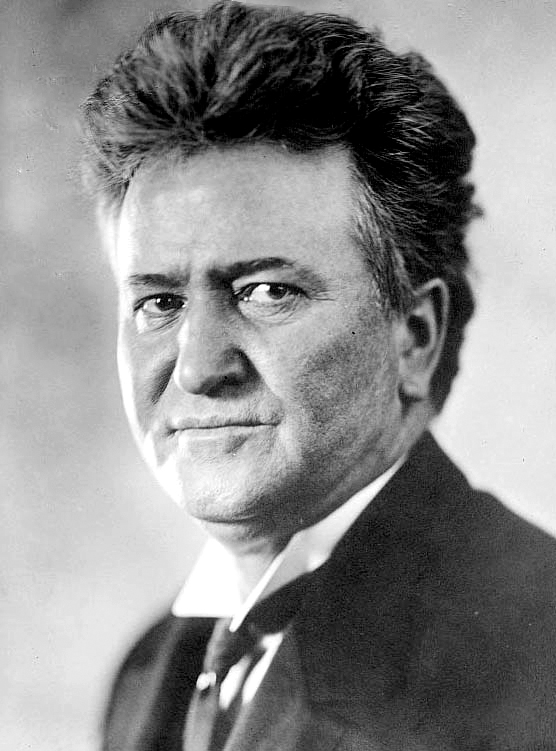 The strong Progressivist,
Senator Robert M. La Follette, Sr. He would strongly oppose
the U.S. entry into the war – and suffer tremendously as war fever rose
rapidly in America (but in 1957, a Senate Committee
selected La Follette as one of the five
greatest U.S. Senators, along with Henry Clay, Daniel
Webster, John C. Calhoun, and Robert Taft.)
The strong Progressivist,
Senator Robert M. La Follette, Sr. He would strongly oppose
the U.S. entry into the war – and suffer tremendously as war fever rose
rapidly in America (but in 1957, a Senate Committee
selected La Follette as one of the five
greatest U.S. Senators, along with Henry Clay, Daniel
Webster, John C. Calhoun, and Robert Taft.)
Library of Congress
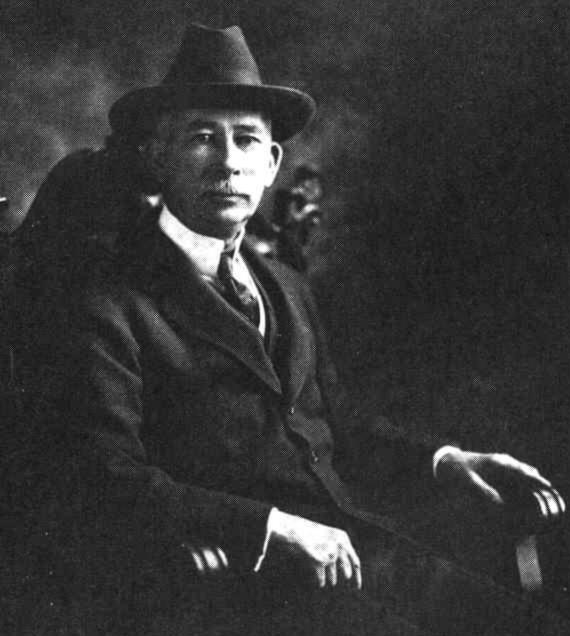 Col. E.M. House – special
advisor to President Wilson
Col. E.M. House – special
advisor to President Wilson
Library of Congress
 Robert Lansing – Anglophile
Secretary of State (who had his difficulties with Wilson)
Robert Lansing – Anglophile
Secretary of State (who had his difficulties with Wilson)
Library of Congress
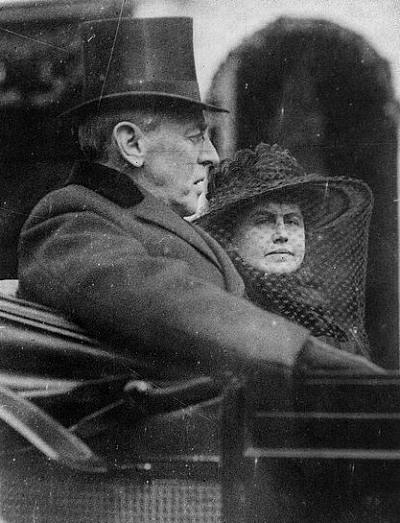 Wilson and his second wife
Edith (married December 1915). She became a very assertive,
but not particularly politically astute, advisor to the president
Wilson and his second wife
Edith (married December 1915). She became a very assertive,
but not particularly politically astute, advisor to the president
Library of
Congress
Pershing and fellow American
officers in Liverpool England just before leaving for France - 1917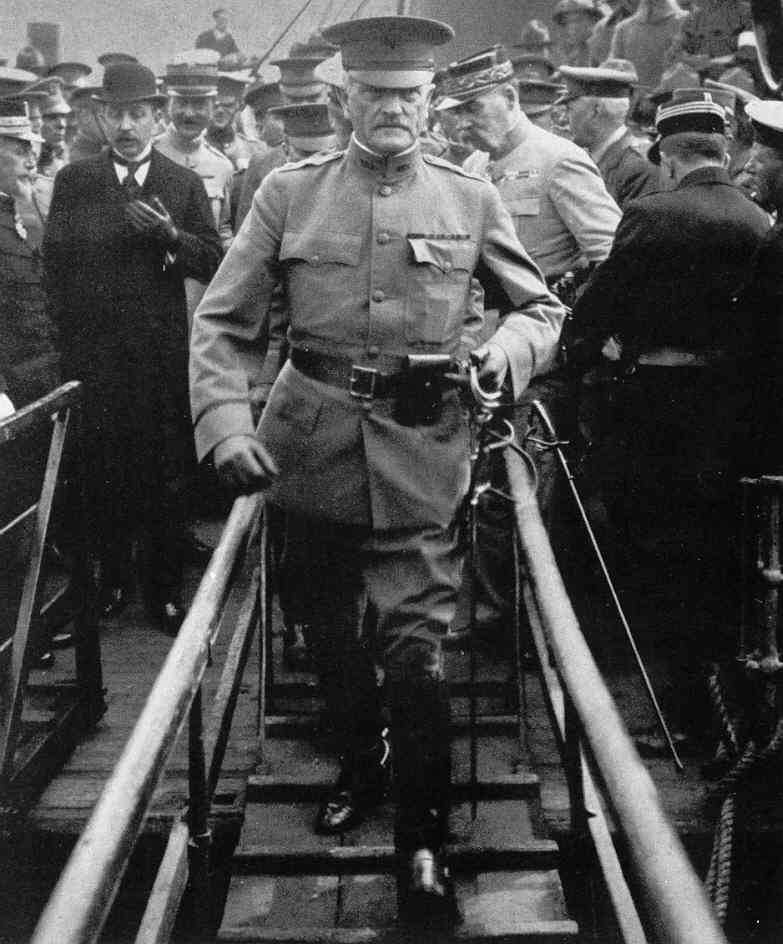
General Pershing arrives
in France - June 13, 1917
 "Lafayette, we are here!"
"Lafayette, we are here!"
Pershing speaking at Lafayette's
tomb outside of Paris (actually the words were
pronounced elsewhere by another American officer but attributed to Pershing because of the
censor's refusal to mention any other US officers by name)

General Pershing meeting
with French leaders Poincaré and Pétain
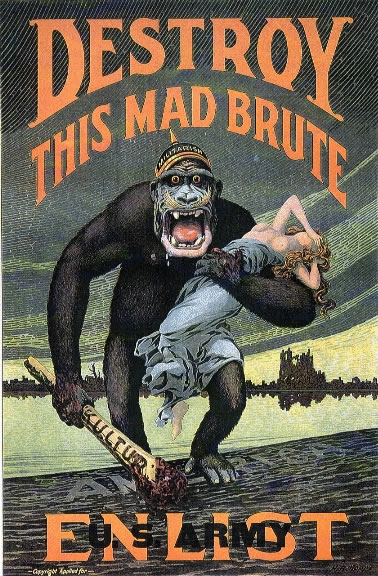 The US Public Information
Committee adopted this British poster
in an effort to stir up American
war fever
The US Public Information
Committee adopted this British poster
in an effort to stir up American
war fever
Wikipedia - "Committee on
Public Information"

American
recruits

American recruits ready to
go
 New York - 5th Avenue - Flag-waving
well wishers send off the American boys to the European War
New York - 5th Avenue - Flag-waving
well wishers send off the American boys to the European War

An American family saying
Goodbye
National Archives
NA-111-SC-16571
The War shifted political
alliances -- at least temporarily

Suffragettes register to
work as war volunteers during world war I
National Archives
But not everyone bought into
the shift

"Woman anarchist leader and
aid in draft war. Emma Goldman and Alexander Berkman convicted of conspiracy
against draft law and sentenced to two years in penitentary and finded
$10,000 each, July 9, 1917."
National Archives
To finance the War a major
campaign to raise money via war loans got underway (American incomes were not
yet taxed directly by the Federal Government)
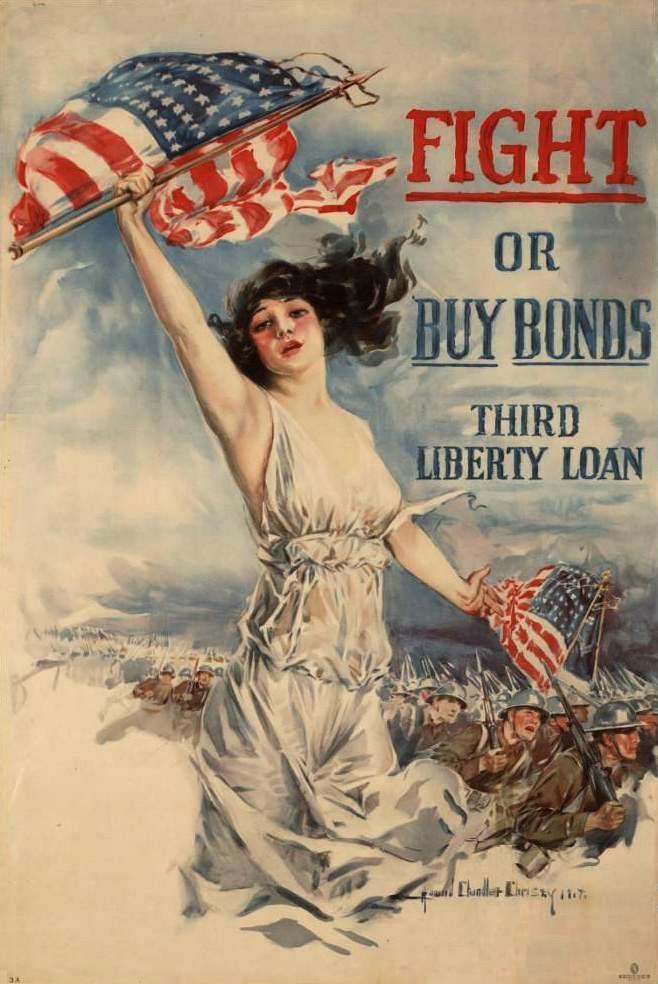 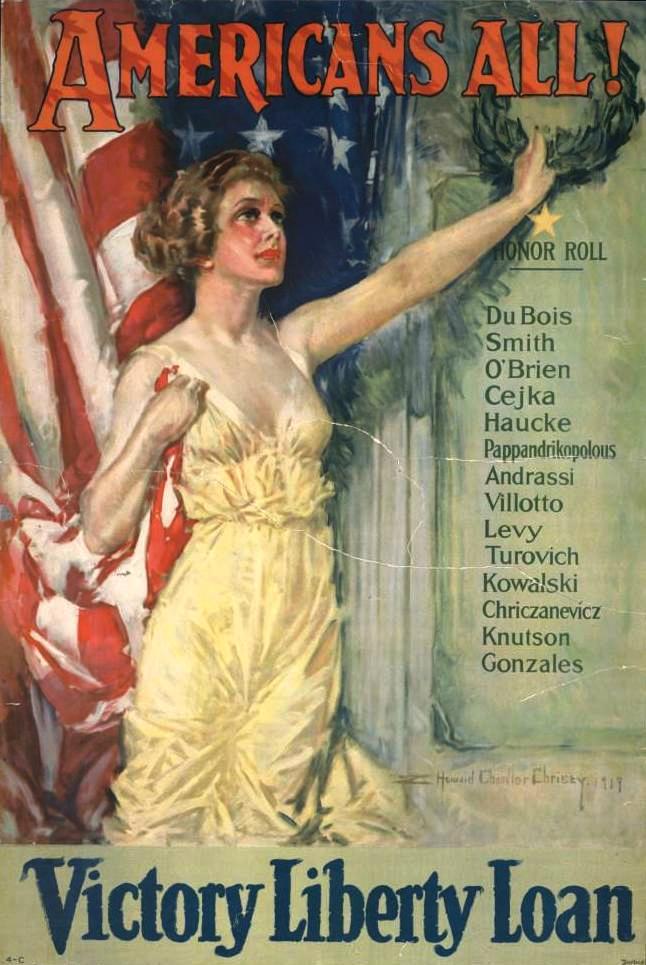 Color posters by Howard Chandler
Christy
Color posters by Howard Chandler
Christy
Before the end of the year
American troops begin to pour into Europe

American troops arrive in
London - August 1917
National
Archives

Newly arrived American troops
marching through London

New American troops - winter
1917-1918
KERENSKY'S
PROVISIONAL GOVERNMENT CONTINUES THE RUSSIAN WAR EFFORT |

Alexander Kerensky takes
charge of the Provisional Government – and continues the Russian
war effort
Russian troops awaiting a
German attack. This is a typical rear-guard
trench, characteristic of the field fortifications of the great retreat.
National Geographic Magazine,
Volume 31 (1917), page 379
The Failed Kerensky Offensive
– July 1917
 June 1917 – Petrograd soldiers
protesting Kerensky's orders to send more men to the German front.
June 1917 – Petrograd soldiers
protesting Kerensky's orders to send more men to the German front.

 Marshall, p. 226.
Marshall, p. 226.

Russians, hearing reports
that German cavalry have broken through Russian lines, have thrown down their guns
and are in full flight – summer 1917.
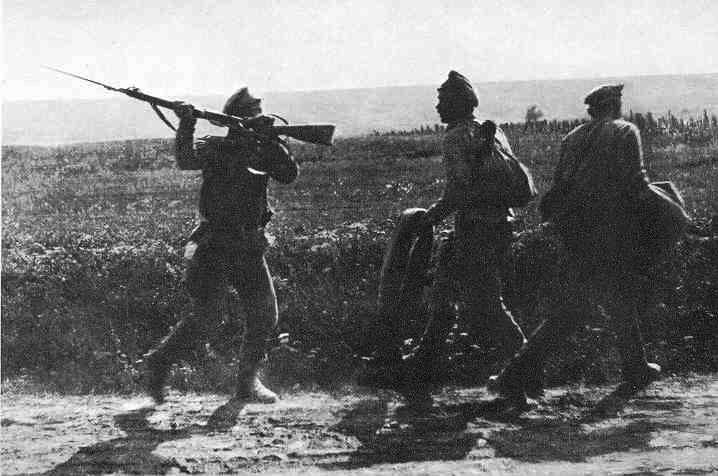 Russian soldier trying to
get his comrades to return to duty
Russian soldier trying to
get his comrades to return to duty

Soldiers machine-gunning
down protesters on the Nevsky Prospekt in Petrograd – mid-July 1917
RUSSIA'S "OCTOBER REVOLUTION"
[taking place in early November on the Western calendar] |
What
the Russian intellectuals of the Provisional Government failed to
understand was that the Russian people were not demanding democracy
(whatever that might have even meant to them). They simply wanted
out of this needless war. The decision of the Provisional
Government to pursue the war in furtherance of the cause of democracy
quickly put the new government in the estimation of the average Russian
in the same category as the old Tsarist government. Failure of
the Provisional Government to understand this basic fact would prove to
be its undoing.
The initial reaction of the Russian people at the news of the downfall
of the Tsarist government had been one of a heady euphoria. They
supposed themselves now to be free from all the social suffering they
had experienced under the old order, especially with the arrival of the
war. Peasants simply assumed themselves now to be the owners of
their own lands and refused payments to the landed nobility; industrial
workers demanded control of their factories; and soldiers began to
desert their posts to go home to their farms in order to take charge of
their own new destinies. Truly Russia was in a state of major
social revolution.
Thus the hope of the Provisional Government in May of 1917 in placing
Alexander Kerensky at its head was that Kerensky’s closer identity with
the Russian revolutionaries (he was a member of the Social
Revolutionary Party and vice-president of the Petrograd Soviet) might
swing them finally in support of the Provisional Government’s
democratic revolution. But Kerensky was up against another
group of revolutionaries even more formidable than his Social
Revolutionaries: the Marxist Communists (or Bolsheviks) led by Vladimir
Lenin and his close associate Leon Trotsky (who at the time was away in
New York), two men who had long been underground or abroad planning for
just such a revolutionary event.
Russian Bolsheviks were returning to Russia in mass numbers now that
the Provisional Government had liberalized its laws (undoubtedly a big
mistake). But the Germans wanted to make sure that this influx
included the most important Bolshevik of all, Lenin, and brought him by
train from Switzerland to Finland just across from Petrograd. The
German goal was obvious, as Lenin had made very clear that his
political objective was the building of a new Soviet society, not the
continuance of an unnecessary war. The Germans well knew that any
Russian pullback from the war would free up vast number of German
soldiers needed on the Western front. The Germans needed to
conduct one last lunge at Paris to bring France to its knees before the
American troops started to arrive in numbers in the coming spring
(1918). They would need as many soldiers as they could possibly
gather for this great offensive.
Once in Russia Lenin began to make his move to take control of the
Russian revolution. He promised the Russian people two things:
land for the peasants and the coming home of the Russian
soldiers. This was a such a compelling program that the
Provisional Government had no effective counter-offer for the
people. Then Lenin and Trotsky began to organize the political
support they would need to take control of Russia. Trotsky was
able to gain complete control of the military committee of the powerful
Petrograd Soviet before seizing power of all vital points in the
nation’s capital on the night of November 6-7 (October 24-25 on the
Russian calendar). The members of the Provisional Government in
the Winter Palace quietly surrendered the next day. Lenin’s
Bolsheviks were now in control of the Russian nerve center ... and
ready to spread their control over the rest of Russia. |
Lenin arrives in Russia to
take over the Petrograd Soviet
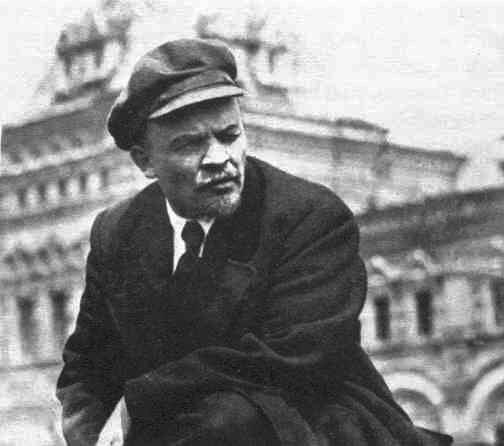 Lenin addressing a Petrograd
crowd
Lenin addressing a Petrograd
crowd
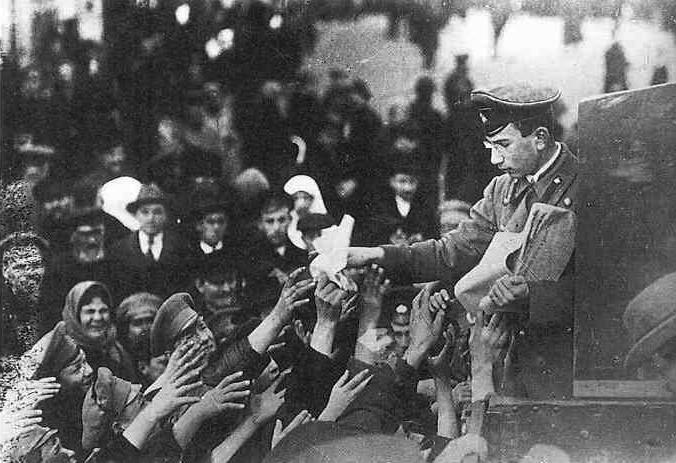 A Bolshevik hands out Revolutionary
newspapers
A Bolshevik hands out Revolutionary
newspapers
 Soldiers demonstrating for
Communism
Soldiers demonstrating for
Communism

Petrograd - Armed Bolshevik
supporters marching against the Provisional Government

The storming of the Winter
Palace, October 1917 (actually from a re-enactment
directed in 1927 by Sergei Eisenstein for his movie October )
 Petrograd - Crowd gathers
in front of the Winter Palace to hear Lenin
Petrograd - Crowd gathers
in front of the Winter Palace to hear Lenin
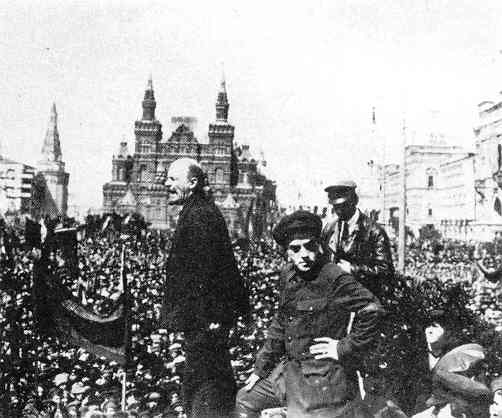 Lenin speaking to a massive
Petrograd crowd on behalf of the Communist Revolution
Lenin speaking to a massive
Petrograd crowd on behalf of the Communist Revolution

Bolshevik soldiers in Petrograd
who wandered the streets in support of the October Revolution
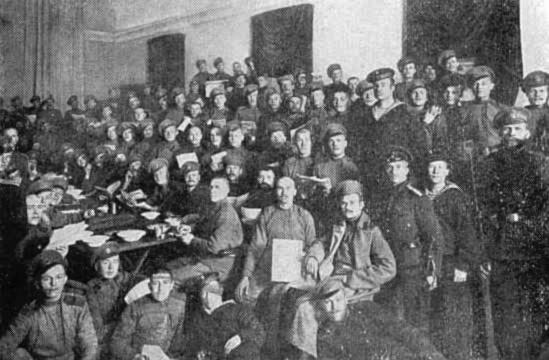 ome of the Kronstadt sailors
and Bolsheviks who helped to overthrow the Russian Provisional
Government
ome of the Kronstadt sailors
and Bolsheviks who helped to overthrow the Russian Provisional
Government
THE
WAR IN THE MIDDLE EAST AND AFRICA |
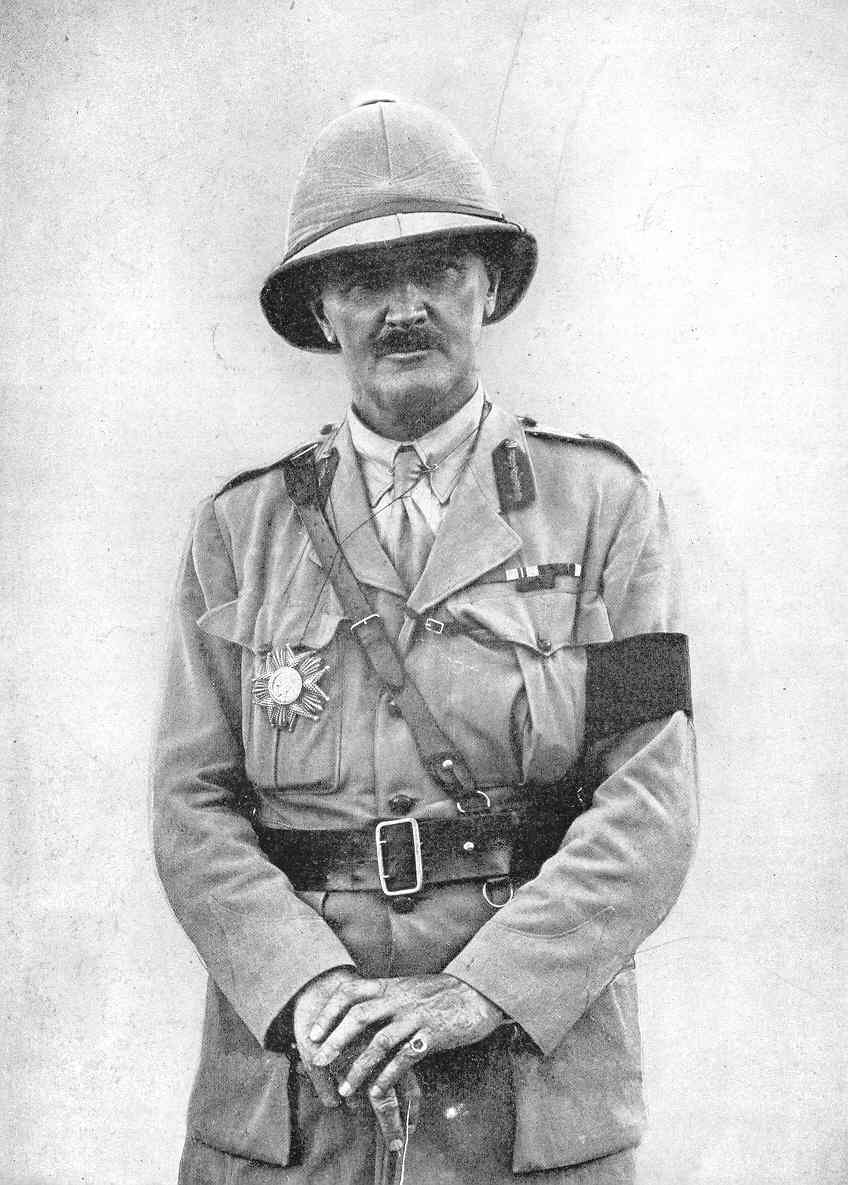
Allenby
Imperial War Museum,
London
 Col. T.E. Lawrence - "Lawrence
of Arabia"
Col. T.E. Lawrence - "Lawrence
of Arabia"
Imperial War Museum,
London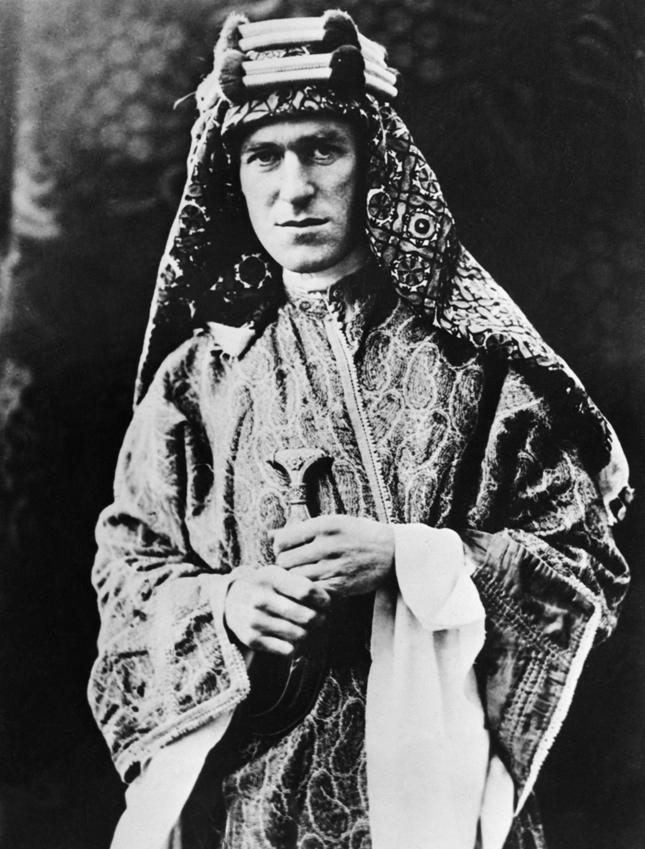

 Miles
H. Hodges Miles
H. Hodges
| |


 The German pullback to the Hindenburg
The German pullback to the Hindenburg Russia's "February Revolution"
Russia's "February Revolution"
 The English squander more men to
The English squander more men to The Italians retreat from Caporetto
The Italians retreat from Caporetto
 The German homeland struggles under
The German homeland struggles under Kerensky's Provisional Government
Kerensky's Provisional Government  The war in the Middle East and Africa
The war in the Middle East and Africa


















































































